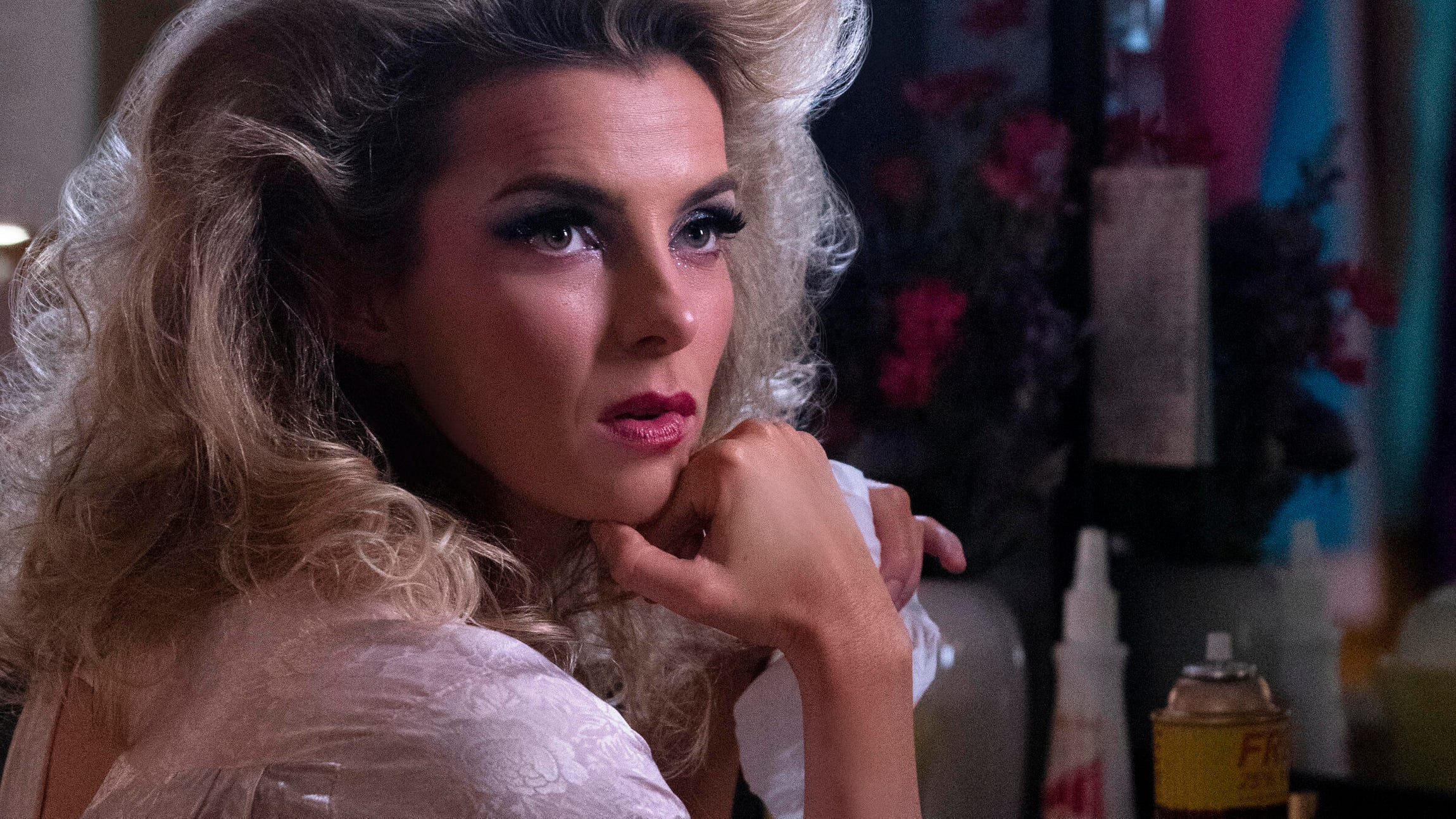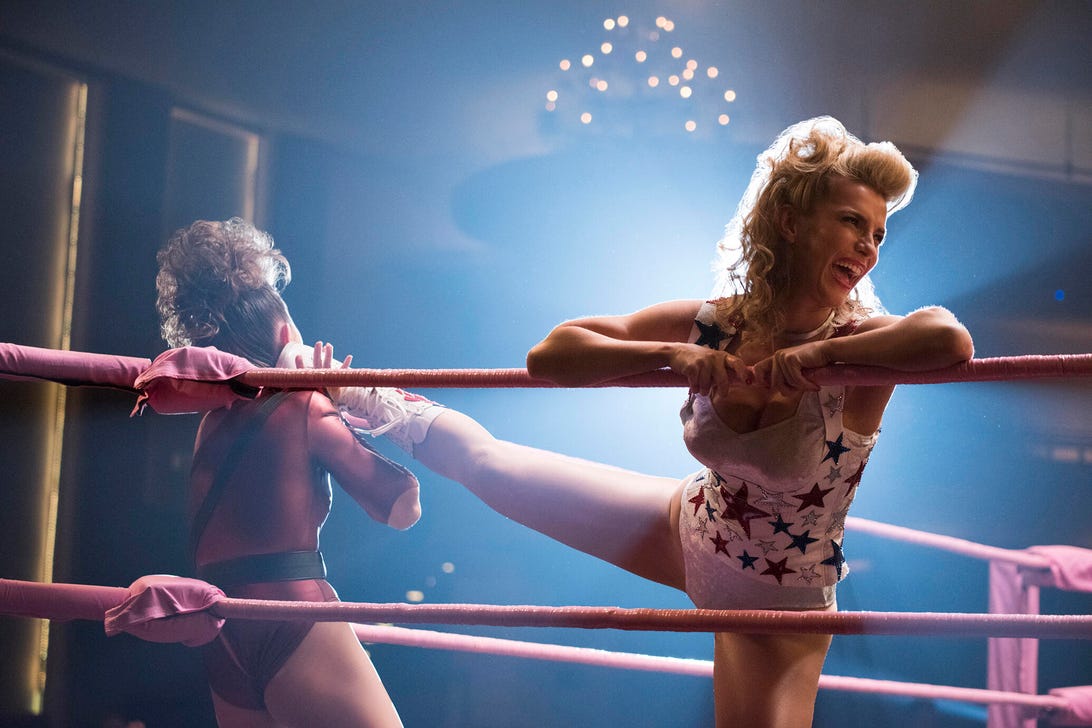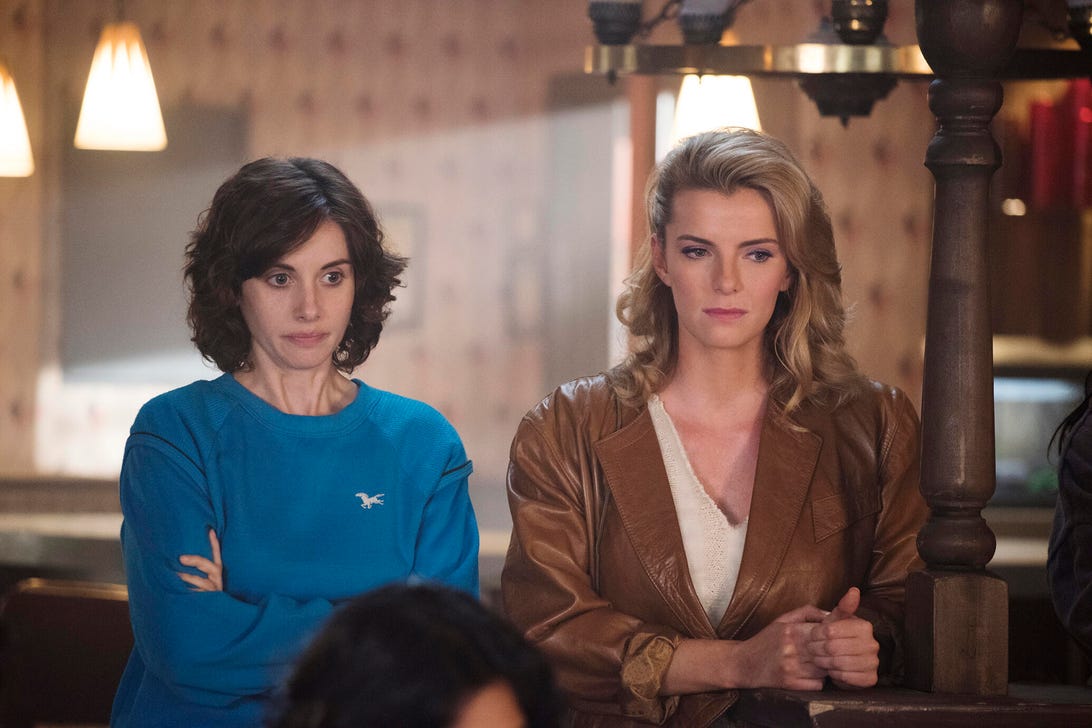
GLOW's Betty Gilpin Is Ready for Debbie to Take 'the Least Likable Path'
Gilpin spoke to TV Guide about how her character's messy ambition sidesteps the trap of the girlboss
Betty Gilpin describes playing Debbie Eagan, the soap actress-turned-wrestler she brings to life on GLOW, like being split through a prism. Sometimes she's in a "secret little quiet play," as Gilpin puts it, and sometimes she and her co-stars are "little urchins playing for the mezzanine." In the ring, Debbie transforms into Liberty Belle, an American sweetheart dialed up to 11 and swaddled in spandex. But the really intimate, bruising fights go down outside the ring, where Debbie is a mess of ambition and insecurity. As she grasps for a 1980s vision of power, there are moments when the character is a fantasy of ruthless self-expression, yelling at men with her hair teased out like a helmet and a baby on her hip. And yet she's looking for acceptance from an industry that tears down women, and it's still doing a number on her.
GLOW has always been interested in the damage the entertainment industry can do to women. In its third season, the Netflix series turned its attention to live theater when the Gorgeous Ladies of Wrestling took their act to Vegas and made it a nightly show. The change of scenery was good for Debbie's fraught friendship with Ruth (Alison Brie), but it strained her as a working mother and tested her as a producer. By the finale, Debbie decided that if she wanted a seat at the table, she would have to kick her boyfriend, Tex (Toby Huss), out of his. She stole a deal Tex had been trying to close, which cost a troupe of showgirls their jobs — and by making Bash (Chris Lowell) the respectable face of the deal, she also forced him to stay closeted, a cutthroat move even if she was giving him what he'd asked her for. The season ended with Debbie almost vibrating with excitement, unconcerned with the consequences of her empowerment.
Gilpin's electric performance embodies the balancing act that makes GLOW so magical: It can tell such knotty stories and still be so much fun. It's clear the joy starts on set. "There are so many times in my life as an actor where I feel like I've really done stuff for a paycheck, or begged for a job that then, when I got it, it made me feel small," Gilpin told TV Guide over Zoom in May. At the time, she was supposed to be filming GLOW's fourth and final season, which was two episodes into production when it was suspended due to the pandemic. "I'm just so insanely grateful that before the apocalypse the last thing I slipped under the door was some of the best and worst acting, probably, of my life," she laughed, "in the most absurd, wonderful show."
In a thoughtful conversation, Gilpin weighed in on the realism of Debbie's complicated ambition, resonating with her character's body image issues, finally getting to play friends with Alison Brie, and finding the "old lady gremlin" within.

Alison Brie and Betty Gilpin, GLOW
Erica Parise/NetflixI wanted to start by talking about the end of Season 3, because Debbie makes some really complicated moves. She steals Tex's deal out from under him. She gives Bash a reason to stay in the closet. What do you think is motivating Debbie at this point?
Betty Gilpin: She's at this fork in the road in her life, I feel. It's either, "I'm going to go down this path that's a little murkier and riskier, towards a model of myself that I think could be magnificent and powerful and dominant, but I don't really know what that looks like. I do know what the other path looks like: to be a trophy wife, or to be arm candy." And she's sort of feeding both sides throughout the season, just not putting all her eggs in one basket and not really knowing which way she's going to go. And then at the last second, she's like, "Oh, I think this whole time I've just been dating this guy because he was a version of a person that I want to be. I want to be powerful. I want to be in control of these business lunches and making big, risky high-number decisions. I don't want to be near that person; I want to be that person." And I think throughout time so many women have had to settle for being near that person when they should be CEOs themselves. So we're just seeing Debbie suddenly roll the dice on herself and realize in retrospect the ways that she's sort of been standing in the way of her own empowerment. I mean, society and people around her were doing a lot of it. But I think Debbie could learn a little from Ruth in terms of self worth, and betting on yourself, and she finally does. It just so happens that Ruth is not in the same place as her, or Ruth's version of betting on yourself contradicts Debbie's version, sadly.
How much do you empathize with Debbie in that moment? Because she is making some choices that affect a lot of lives outside of her own for her own empowerment.
Gilpin: I think that she's taking the least likable path. And for Debbie, who was used to playing characters in the ring and on screen and in her own life where you have to be the "thank you very much" sparkly beauty queen who is likable, for her to do something so cutthroat... It's a heel move that she does. It's very Zoya. But I think she actually is excited by and surprised by how much she likes it. You can see in certain business people's eyes when they make a deal or something, you see a kind of gambling addict-ness to them. And Debbie is discovering that part of herself, like, "Oh, I love these high-risk situations and making deals in the dead of night and screwing people over." I think there's a part of Debbie that's like, "I didn't even know that this was one of my passions." But it is.
I like that GLOW isn't really girlboss-y, for lack of a better word, about women's ambition. It's messy. There are always consequences.
Gilpin: Our writers do a really good job of being true to the time and true to the history of women's empowerment. There's a trap that's easy to fall into right now where you can kind of make echo chamber propaganda where Woman in Blazer says something and everyone stands up and claps and is like, "OK, you killed it. Wow. All the doors open for you now," because any sort of conflict would be anti-feminist or something. And if I were a woman who had been a businesswoman in the '80s watching an episode of GLOW where a woman speaks and everyone listens, I'd be like, "Yeah, that wasn't my experience in 1985." I think that it does a disservice to those people who had to experience being silenced by the people around them and the voices in their own head, because there weren't a lot of examples around them. There weren't many female network heads. There was maybe one at that time, and it's hard to strive for a goal that doesn't exist yet. And I think that our show does a good job of painting the gray area. For better or worse.
What do you hope for Debbie in the final season?
Gilpin: I hope that Debbie finds a way to make her flaws her superpower. She's got so much rage and so much churning inside her that if treated and watered properly could be funneled into her being a business superpower. But I worry that if she runs at this version of herself in a panic, she's going to miss out on the other parts of life too. I think that there's a way for her to funnel her rage into work and then find gentleness and vulnerability and acceptance and listening skills in other aspects of her life, like her friendship with Ruth. Even though Ruth slept with Debbie's husband, there was lots wrong with their friendship before that, and I think it involved Debbie not listening to her friend and taking up most of the space in the room, and Debbie would do well to examine what she was doing wrong. I don't know if that's going to happen though. Debbie doesn't really like self examination.
GLOW Showrunners Break Down That Cliffhanger Ending
You and Alison Brie had some great friend chemistry this season. Obviously, there's still tension between them, but what was it like to play Ruth and Debbie on better ground?
Gilpin: Oh, finally. It was so much fun. Ali and I, she's one of my best friends now, and it's harder now to turn off our personal dynamic before a scene. Like, "Oh right, I hate you. I can't look at you." So to have this little bubble of a season where, because Ruth and Debbie are in Vegas, and because they're feeling sort of specifically lost in their own lives and lonely, but they're separated from their lives, they can treat their friendship as this showmance almost. Or they're like, "OK, no one's watching, we can just be friends for this second," or, "You know what, my life is falling apart, so why not have a hamburger with you right now?" And that was so much fun because if they had been two different people or their friendship had been different, the pilot of our show would have happened and they would have said, "I'm never talking to that person again." And I think that they are in many ways each other's soulmate in the world, and you don't just cast those people aside. They're few and far between. So there's always been that underlying rope tying them together, whether they like it or not, of loving each other. And here in this Vegas bubble, they can kind of let that love go a little bit. But it all comes crashing down.

Alison Brie and Betty Gilpin, GLOW
Erica Parise/NetflixYou mentioned that hamburger scene. That gets at something else this season dealt with, which is Debbie's body image. You've written so beautifully about your own body image, and I was curious what your take on that storyline was, because it's interesting that it's not exactly resolved. It just fades into the background. What do you think of that story and of how it was handled this season?
Gilpin: I love that they never revisit it again, really. Because I've certainly had my own body image issues and eating issues in my life, and when you're having an episode or something — to say it like "an episode" — it doesn't feel like a Very Special Episode in your life. It feels like this quieter, sadder hum throughout your whole life. You know, there's no season finale, or there's no dramatic turns where it pops up. It's just sort of always there. And I think that is what makes it even scarier, is that Debbie has struggles with bulimia and body dysmorphia, and that's just part of her brain that would be so much harder to extricate from her brain than a one-episode turn. We're just getting a little window into her backstage, like, "Just so you know, this is always going on in the back of her head."
That episode, when I first read that script — there's so many times in our show where we'll read a script and our feelings will be hurt, because so much of wrestling and so much of a show about women is about specifically that person. And while I'm playing a character, it's still my body. So when there's a whole storyline about how big Debbie's ass is, I was like, you know, it's still my ass [laughs]. I went totally through the same thing that Debbie does. I was like, "Well, I guess my ass is huge," and just went down the dark path and then realized, "Oh no, it's more about body dysmorphia than it is about — right. Oh god, I'm part of the problem. Oh, poor Debbie. Poor Betty. Poor society. Anyway, action."
The whole show is about performing, but this season in particular was really about live performing. What is it like for you to play a role that's kind of commenting on your actual profession, and has the show changed how you view acting?
Gilpin: I knew Liz Flahive and Carly Mensch, the creators and our showrunners, for a decade before GLOW started, first as playwrights. We all kind of came up in the theater together in New York. And I feel like Season 3 is a love letter to theater in a strange way, because it feels like you're doing a play out of town or something, where you're doing the same show every night over and over and over again. And the way that sort of plays on your brain and makes you feel like you're going insane, and also makes you compartmentalize your own life, where, like, Ruth and Debbie's friendship is suddenly allowed to blossom. It's a strange world where there's so much pageantry and fantasy involved, where you get to feel like a superhero, and then you wash it all off, and you're lonely in your hotel room and [you're] just this floating entity person who isn't putting roots in the ground in your own life.
There are so many parallels to me of being an actor to just being a person in the world. You want to achieve these moments of feeling like you're running with a spear at the horizon, and feeling like you're a superhero, and feeling like there's a fantastical underbelly to the world and magic exists, and you feel like you're this montage version of yourself. And [at the same time] you want to put roots in the ground and have a family, or plan for yourself long term and take vitamins and read books and think about life when you're 70. And I think so much of being an actress, outwardly, on the surface, focuses on the former — on the more montage-y version of yourself that's going to expire. When actually I think the best acting work comes from focusing more on the latter, on the long-term cavewoman stuff, and feeding your brain for the 70-year-old version of yourself. I just think, especially in the '80s and still now, we're in this time where you're having to hide all that witchy stuff in the montage Barbie shell, still, and get it in the room saying, "No, no, no, this is the shiny montage version of myself," [then] crack open and be the old lady gremlin version. And I think we're moving closer towards being allowed to be our gremlin selves when we walk in the door, but we've got a long way to go.
What kind of scenes scare you the most now? Is it the stunts, or are you more comfortable with those at this point?
Gilpin: In a way the stunt rehearsals are scarier than performing them, because when you're performing them, you're in costume and there's a fake audience and there's a bunch of people watching, and you feel like your inner child star. You're like, "I gotta nail it. I gotta perform." And it makes you jump three feet higher than you did in rehearsal and it makes it hurt a little less when you hit the ground because you just have red light fever. But then it hurts later. What scares me? It's almost the quieter scenes. In a lot of ways it feels like we do two different TV shows. Often during a season, I have to remind myself, "Oh, this is all one show." I'm Liberty Belle and I'm Debbie, and in many ways they're two very different genres. A day where you have to switch back and forth, you have to remind yourself to turn it up when it's time to turn it up and turn it way down when it's time to turn it down. But our set is so conducive to risks that I guess not a ton scares me. I'm still of course scared of sucking and often do, but no one dies when you suck. It doesn't matter. I think I'm a lot less precious about that than I used to be. I used to just — if I had a bad day on set and did bad acting I would not sleep. I would spin out. And then I realized no one cares.
GLOW Seasons 1-3 are available on Netflix.
